Your basket
Your basket is currently empty.
Tampon Case for 4 tampons
-£1
ProViotic - 30 tablets
-£1
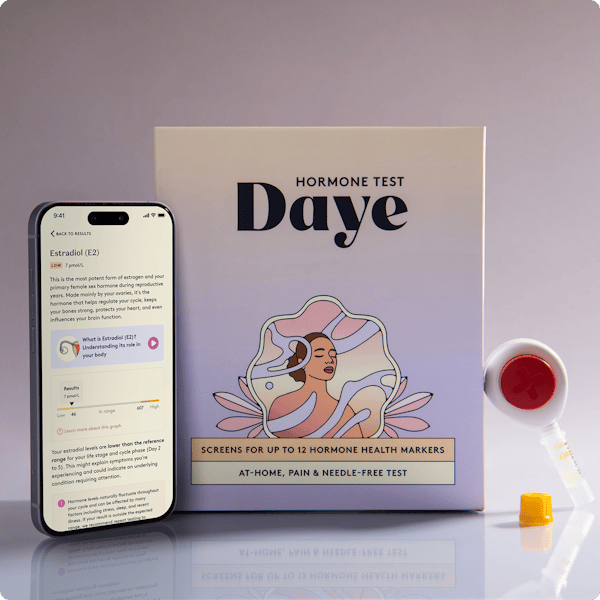

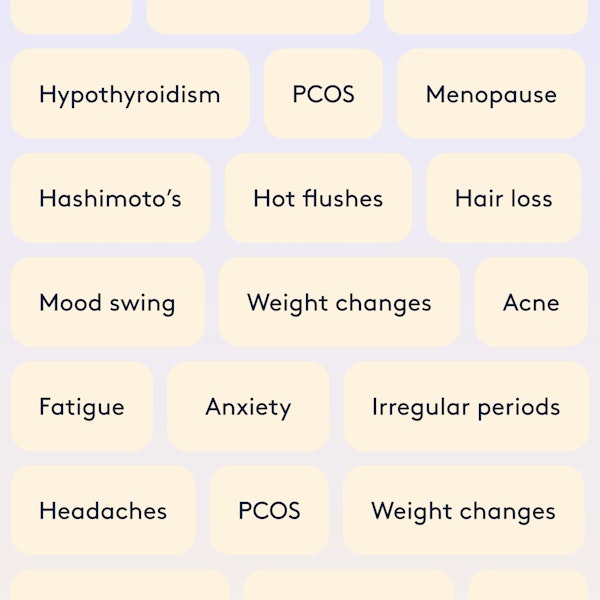
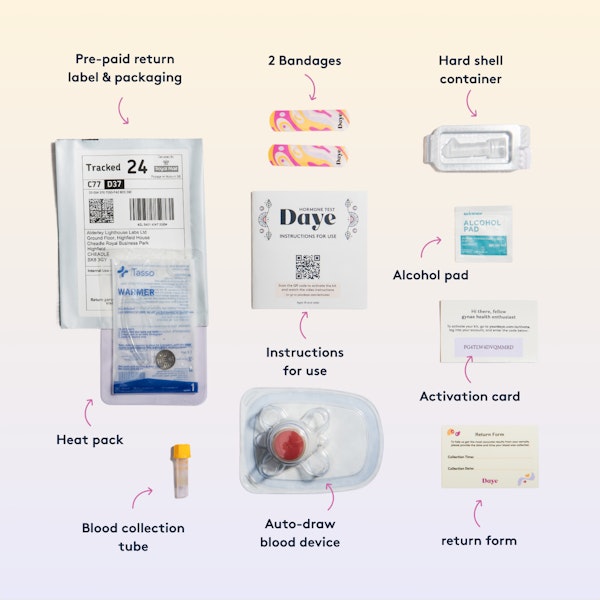
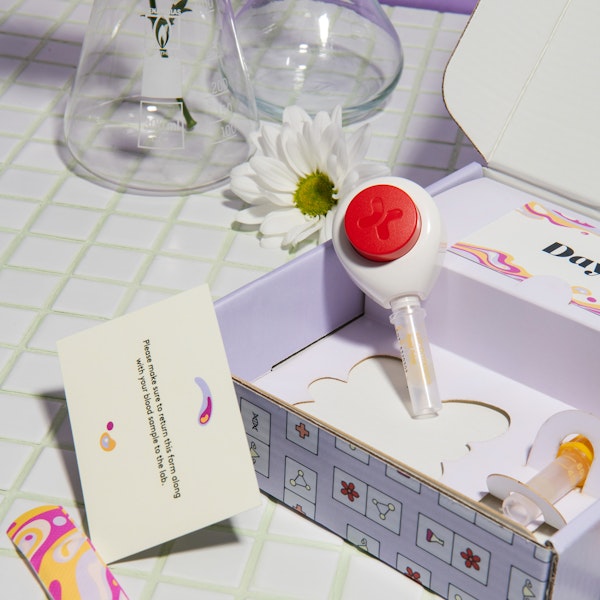
Hormone Test
Monitor and improve your hormonal health at home with Daye's pain-free and needle-free test.
- Comprehensive hormone panel
- Personalised, actionable results
- Clinical-grade accuracy
Daye's at-home hormone test uses a clever autodraw blood device that collects a small sample without any needles or pain. Simply press the red button against your shoulder, and the device does all the work – your sample will be ready in just 3-5 minutes.
Pop your sample in the pre-paid mailer, send it off to our accredited labs, and you'll get your results in 3-7 days. With your results report, you'll receive personalised insights, based on credible clinical research, plus access to our expert team who genuinely get what you're going through.
If you're still having periods, the best time to take your sample is day 2-5 of your cycle (day 1 being when your period starts). This timing gives us the clearest picture of what's happening hormonally.
No periods? You can test any day that works for you – one less thing to worry about.
You'll need to fast for this one – eating ahead of testing can affect your results. Collect your sample first thing in the morning before eating or drinking anything except water. And do drink water – staying hydrated makes the whole process smoother.
This test is designed for women and people with periods aged 18+.
Here's the thing about hormonal birth control or HRT – they're doing their job by changing your hormone levels, which means your test results won't show your natural baseline. We know this might feel frustrating if you're looking for answers while on these treatments, but we want to make sure the results we give you are a true representation of your hormone balance, and it's difficult to get the full picture with external hormones masking what's happening underneath. That's why we don't recommend testing while you're on hormonal contraception or HRT.Your results will land in your inbox 3-7 days after our lab receives your sample. The pre-paid label ensures your sample gets to us within 24 hours of posting – no unnecessary delays.
Here's the honest truth: HRT and hormonal contraception are designed to change your hormone levels, so your test results won't reflect what's naturally happening in your body.
Here's what gets affected:
- FSH, LH, Estradiol: These often get suppressed or altered because your body thinks it doesn't need to produce them naturally
- Prolactin: Usually stays put – this one's pretty resilient
- Testosterone: Birth control often increases SHBG (the protein that binds testosterone), so you might see lower readings
- TSH, T4: Your thyroid usually carries on as normal
- Ferritin, Vitamin D: These don't really care what hormones you're taking
If you're on these treatments, your results will be like trying to understand your natural sleep pattern while drinking coffee all day – not impossible to interpret, but definitely trickier. That's why we don't recommend testing while you're on hormonal contraception or HRT.
Who is the test for?
Fertility issues
Irregular periods
Weight changes
Difficulty conceiving
PCOS
Thyroid Health
Fatigue
Weight changes
Mood changes
Feeling cold/hot
(Peri)menopause
Hot flushes
Mood swings
Irregular or missed periods
Hormonal imbalances
Irregular periods
Acne
Fatigue
Weight changes
What we test for
Daye offers a comprehensive hormone panel, allowing you to get to the bottom of your symptoms.
Stimulates the growth of ovarian follicles and egg maturation. Key for regulating the menstrual cycle and fertility.
Plays a role in:
Ovarian failure
Perimenopause
Low libido
PCOS
Pituitary gland function
Triggers ovulation and regulates reproductive hormones. Essential for fertility and menstrual health.
Plays a role in:
Ovarian failure
Pituitary gland function
Perimenopause
Stimulates milk production and supports reproductive health. High levels can suppress ovulation.
Plays a role in:
Irregular periods
Absent periods
Headaches
Reduced fertility
Reduced sex drive
Supports follicle development, thickens the uterine lining, and regulates the menstrual cycle. Vital for reproductive and bone health.
Plays a role in:
Painful Sex
Irregular Periods
Mood Shifts
Hot Flashes
Breast Tenderness
Headaches
Weight Gain
Influences libido, muscle mass, and energy levels. Present in smaller amounts in female patients but important for overall wellbeing.
Plays a role in:
Decreased bone/muscle mass
Lower metabolism
Reduced libido
Measures the ratio of testosterone to SHBG, indicating androgen activity. Helps assess conditions like PCOS.
Plays a role in:
Thyroid disorders
Hypothyroidism
Hyperthyroidism
Binds to sex hormones (testosterone, estrogen) and regulates their availability. Low levels are linked to insulin resistance.
Plays a role in:
Decreased libido
Fatigue
Vaginal dryness
Facial and body hair
Thinning hair
Acne
Supports egg development, fertility and menstrual cycle regulation.
Plays a role in:
Irregular menstrual
Difficulty conceiving
Premature menopause
PCOS
Stimulates the thyroid to produce T4 and T3. Regulates metabolism, energy, and overall cellular function.
Plays a role in:
Premature menopause
Hypothyroidism
Hyperthyroidism
Anxiety
Weight loss
Weight gain
Dry skin
Fatigue
Active thyroid hormone that regulates metabolism. Imbalances can cause hyperthyroidism or hypothyroidism.
Plays a role in:
Thyroid disorders
Hypothyroidism
Hyperthyroidism
Anxiety
Weight loss
Weight gain
Dry skin
Fatigue
Supports bone health, immunity, and hormonal balance. Deficiency is linked to fatigue and weakened immunity.
Plays a role in:
Fatigue
Muscle weakness
Bone pain
Increased risk of infections
Ferritin is a protein that stores iron in the body and releases it when needed. It helps regulate iron levels and is commonly used to measure iron deficiency or overload.
Plays a role in:
Anemia
Extreme Fatigue
Weakness
Pale skin
Headaches
Dizziness
Brittle nails
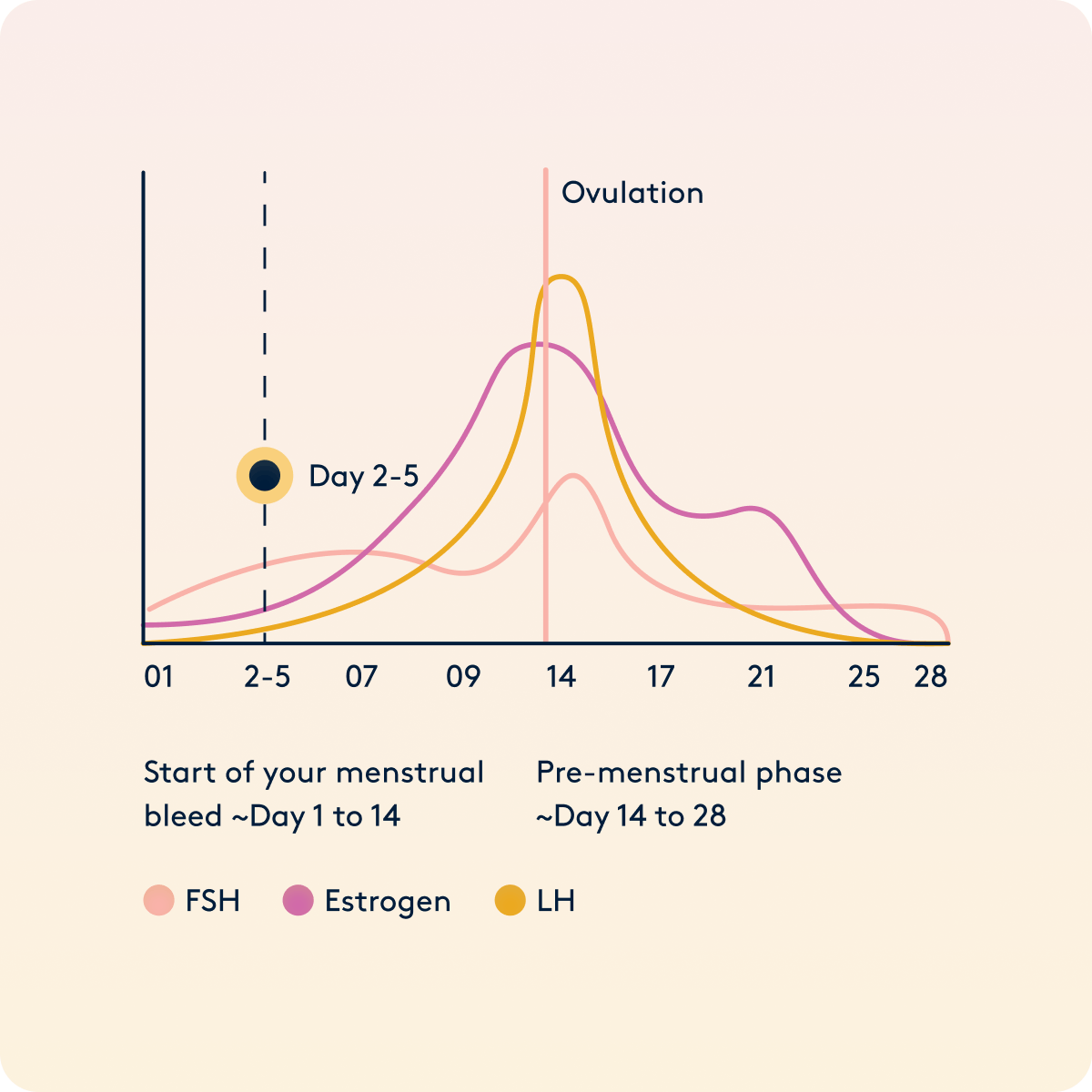
When should you test your hormones?
The best time to do this test is on day 2 to 5 of your cycle (day 1 is your first day of bleeding) — this is when your results can be accurately interpreted. If you're no longer menstruating, you can get tested on any day.
Get answers with your hormone test
Comprehensive hormone panel
Personalised recommendations

Empathetic medical support
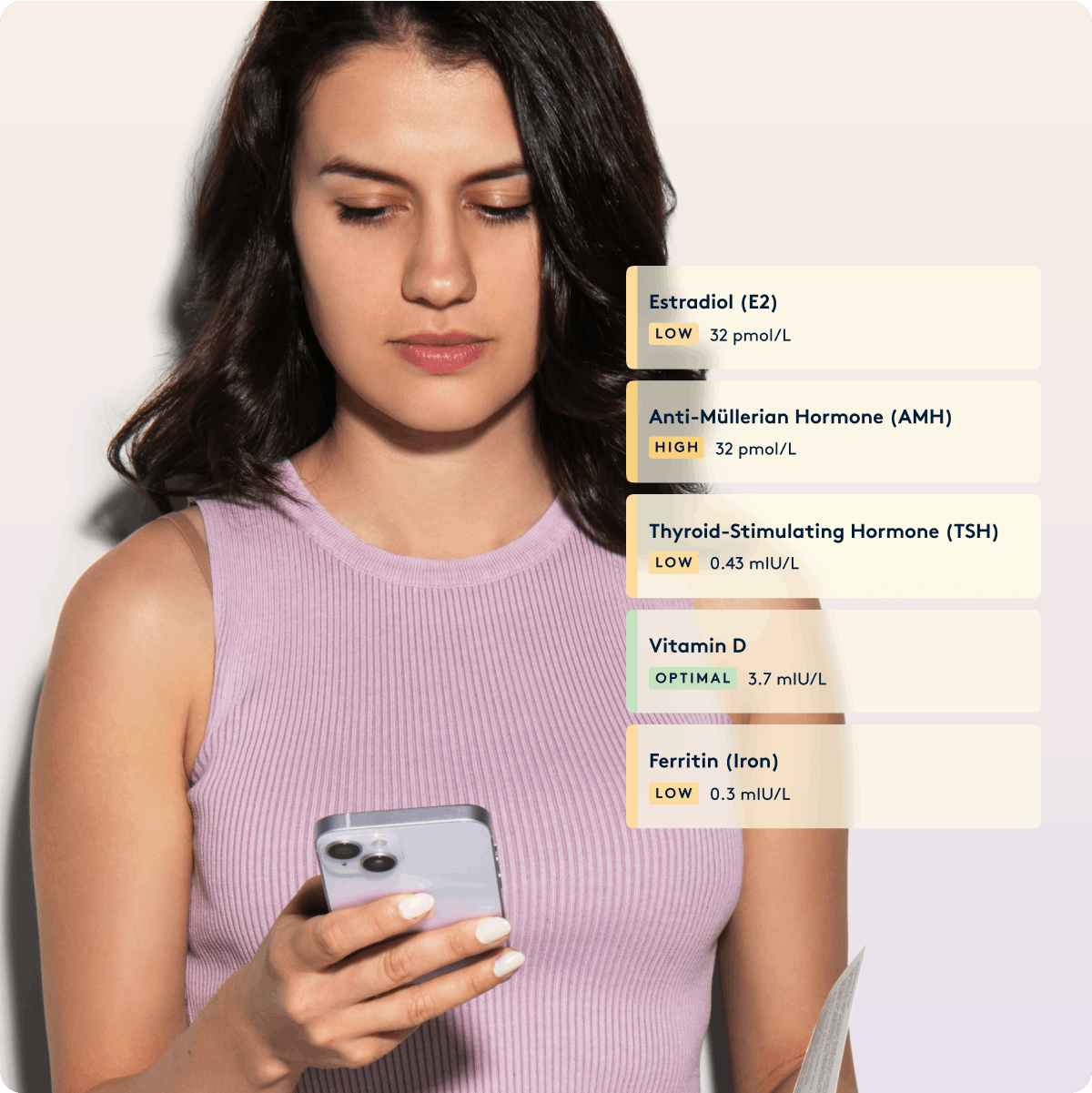
Get an overview of your of your hormonal balance
Hormonal health can be complex, so we're here to make it simple and accessible. Get your hormone profile tested and receive a comprehensive overview of your hormone levels.
Meet our nurses
Our dedicated team of gynae health experts are ready to support you on your journey to vaginal nirvana. Whatever your question, our nurses are here to give you personalised advice and make sure your gynae care journey is enhanced with the right Daye products.
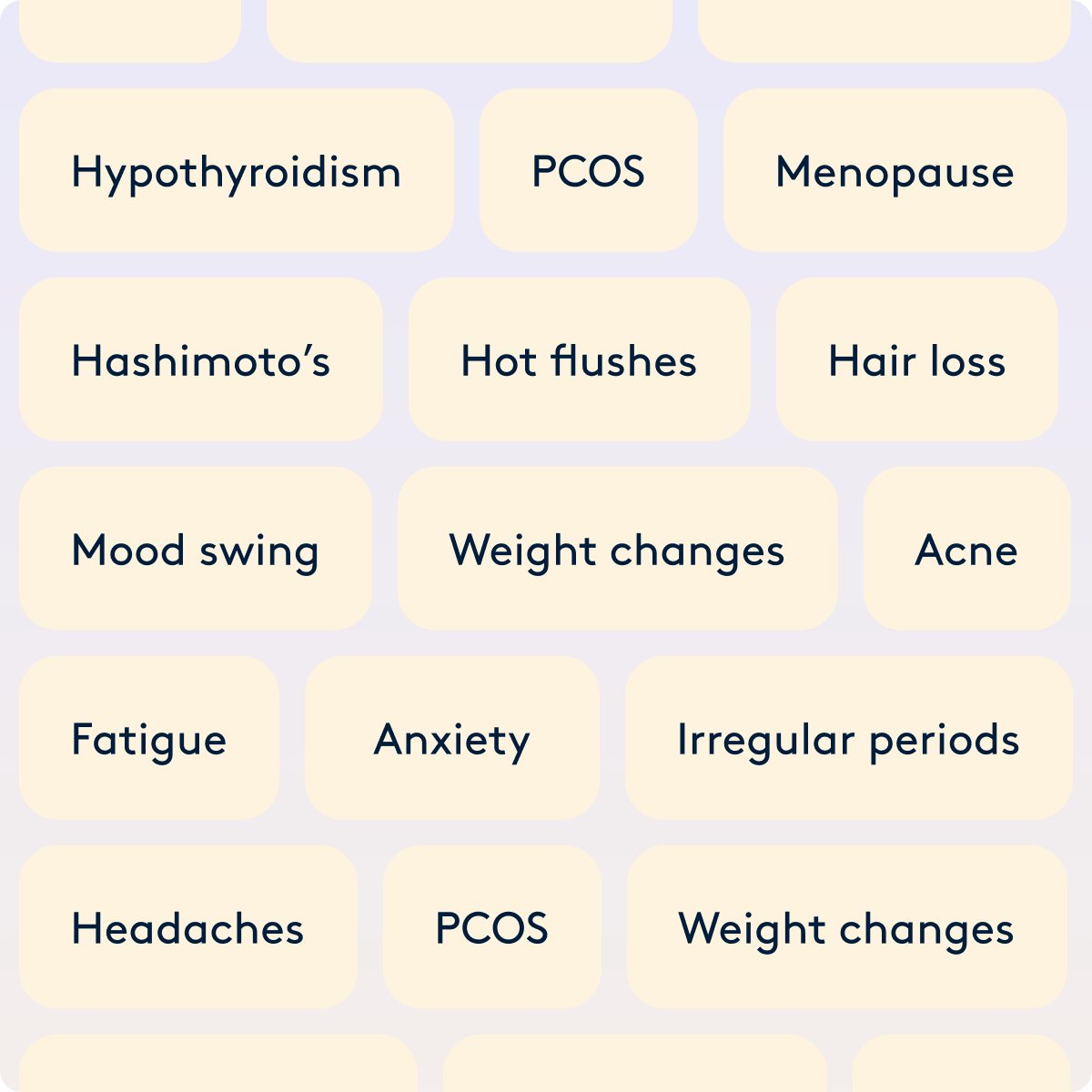
Understand the workings of your body
Gain insights into your hormone levels and support your health with informed choices.
Here's how the service works:
Order your test & get a kit delivered to your door
The kit will arrive at your doorstep in a discreet package. No more awkward queuing in clinic waiting rooms.
Activate your kit before you start
Activate your kit with your unique code and complete the questionnaire.
Get everything ready
Lay out your kit and get your arm ready. Wash and dry your hands, prepare a clean surface, and warm your upper arm with the heat pack for 2 minutes.
Collect your sample
Attach the device to your arm, press the red button, and let it collect the sample for 5 minutes or until it reaches the fill line.
Send your sample back the same day
Place the tube in the protective case, complete the form, and post it in the prepaid envelope. No need to refrigerate.
Developed with the leading minds in hormone health
Dr. Amira Bhaiji
Internal Medicine Trainee
Dr. Shazia Malik
Consultant Obstetrician
Dr. Melanie Bone
ACOG certified OBGYN
UKAS-certified laboratories

We are proud to support the work of A21 in their mission to abolish slavery everywhere, forever. For more information, head over to their website A21.org

Your data is for your eyes only
Protecting your privacy is the least we can do
We’re here to answer all of your questions
Still have questions? Read all of our FAQs.
Daye's at-home hormone test uses a clever autodraw blood device that collects a small sample without any needles or pain. Simply press the red button against your shoulder, and the device does all the work – your sample will be ready in just 3-5 minutes.
Pop your sample in the pre-paid mailer, send it off to our accredited labs, and you'll get your results in 3-7 days. With your results report, you'll receive personalised insights, based on credible clinical research, plus access to our expert team who genuinely get what you're going through.
If you're still having periods, the best time to take your sample is day 2-5 of your cycle (day 1 being when your period starts). This timing gives us the clearest picture of what's happening hormonally.
No periods? You can test any day that works for you – one less thing to worry about.
You'll need to fast for this one – eating ahead of testing can affect your results. Collect your sample first thing in the morning before eating or drinking anything except water. And do drink water – staying hydrated makes the whole process smoother.
This test is designed for women and people with periods aged 18+.
Here's the thing about hormonal birth control or HRT – they're doing their job by changing your hormone levels, which means your test results won't show your natural baseline. We know this might feel frustrating if you're looking for answers while on these treatments, but we want to make sure the results we give you are a true representation of your hormone balance, and it's difficult to get the full picture with external hormones masking what's happening underneath. That's why we don't recommend testing while you're on hormonal contraception or HRT.
Your results will land in your inbox 3-7 days after our lab receives your sample. The pre-paid label ensures your sample gets to us within 24 hours of posting – no unnecessary delays.
Here's the honest truth: HRT and hormonal contraception are designed to change your hormone levels, so your test results won't reflect what's naturally happening in your body.
Here's what gets affected:
- FSH, LH, Estradiol: These often get suppressed or altered because your body thinks it doesn't need to produce them naturally
- Prolactin: Usually stays put – this one's pretty resilient
- Testosterone: Birth control often increases SHBG (the protein that binds testosterone), so you might see lower readings
- TSH, T4: Your thyroid usually carries on as normal
- Ferritin, Vitamin D: These don't really care what hormones you're taking
If you're on these treatments, your results will be like trying to understand your natural sleep pattern while drinking coffee all day – not impossible to interpret, but definitely trickier. That's why we don't recommend testing while you're on hormonal contraception or HRT.
We've made your results as clear as possible – no medical degree required. Each marker comes with easy-to-understand explanations and reference ranges, plus personalised insights based on your specific levels.
Still scratching your head? Our team of expert nurses is here to walk you through everything and answer all questions, so you feel in control.
Pregnant? Your hormones are on a completely different adventure right now – they're busy growing a human, which means they'll be way outside normal ranges. The test won't give you useful insights about your baseline health, so it's best to wait until after you've given birth and your cycle has returned.
Breastfeeding? Similar story here. Breastfeeding hormones (like prolactin) are doing their job of maintaining milk production, which suppresses your other reproductive hormones. Your results won't reflect your normal hormonal picture until you've weaned and your periods have come back.
If you're dealing with concerning symptoms during either time, it's worth chatting with your GP or our nurse team about what might be going on.
Most medications and supplements won't affect your results, but there are a few exceptions. When in doubt, ask our team.
First, don't panic – one test is just a snapshot. We'll flag any results that are out of range and our nurse team can help you understand what it means and what to do next. Sometimes it's a simple fix, sometimes you might need to see your GP, but you won't be left hanging.
Our tests use the same clinically validated methods as your GP's office, processed in the same type of accredited labs. The Tasso device is UKCA and CE-marked and designed to be just as reliable as having a phlebotomist do it – minus the waiting room, needles and awkward small talk.
It depends on what answers you're looking for. Tracking symptoms or monitoring treatment progress? Every 3-6 months makes sense. Just want to check in on your hormonal health? Once a year is usually plenty.
Your privacy is our priority. All personal data and results are stored securely and encrypted. We comply with GDPR and ISO27001, and we never share your data without your consent.












